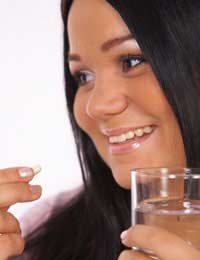Is it Important to Know How Medicines React With Food?

The dangers of food allergies are well known today, as are the adverse reactions that certain people can have to certain medicines. But what are less well known are the consequences of mixing various types of food and medicine together. These range from the less dramatic but serious effects that food can have on the efficacy of medicine to dangerous physical symptoms resulting from mixing what we eat with how we treat illnesses.
Some foods contain chemicals that can react with medicines in ways that render the latter useless. As anyone who has ever taken tetracycline should know, milk is off the menu until the course is completed as the calcium that makes it so useful for promoting healthy teeth and bones prevents the antibiotic from having the desired effect.
While citrus fruit juices are valuable sources of vitamin C, they are bad news if you are taking a course of oral penicillin or erythromycin because, to paraphrase the Verve, the drugs won’t work.
Studies
A recent study by a Canadian research team under the direction of Professor David Bailey, professor of clinical pharmacology at the University of Western Ontario, discovered that grapefruit and other fruit juices substantially decrease the oral absorption of certain drugs.Volunteers took fexofenadine, an antihistamine used to fight allergies, along with either a glass of grapefruit juice, a glass of water with naringin, which gives grapefruit juice its bitter taste, or water. Those who drank the grapefruit juice absorbed only half the amount of the drug compared with those who drank good old H2O.
The research team found that drugs affected by the consumption of grapefruit, orange and apple juice include etoposide, an anti-cancer agent, beta blockers used to treat high blood pressure and prevent heart attacks, and antibiotics including ciprofloxacin. The team says more drugs are likely to be identified as the study continues.
The researchers add that patients should seek medical advice before taking medications with juice, and stick to water when taking most drugs.
So although a spoonful of sugar helps the medicine go down, it might stop it working. But it’s not simply a case of drugs failing to hit their targets. Full-blown medical crises can occur if patients don’t read the small print of the courses they are taking.
Let’s look at the example of bronchodilators, used to treat the symptoms of bronchial asthma, chronic bronchitis and emphysema. Bronchodilators work by opening the air passages of the lungs. However, people taking these drugs must avoid caffeine as both substances stimulate the central nervous system. The results can be dangerous. And lithium, which is used to tackle various psychological conditions, reacts badly with alcohol and can have toxic effects.
Food and medicine react in a multitude of ways depending on the chemicals involved, but there’s no need for alarm. Drugs always carry contra-indications that list the substances to avoid during courses. It pays to be cautious but as long as the guidelines are followed, problems can be avoided. And as always, when in doubt the best advice is consult your doctor. He or she will be able to advise you of what to do.
- High Protein Diets and Drugs
- High Fibre Diets and Drugs
- Timing of Drugs - Before or After Food
- Vitamin Interactions With Drugs
- Why Do Food and Drugs Interact?
- Fatty Food and Drugs
- Will My Doctor Inform Me About My Diet and Medication?
- How Do I Find Out if Foods React With Drugs?
- Can Food and Drug Interactions Be Fatal?
- What Are Drug and Food Interactions?


Re: Which Drugs or Foods React With Enoxaparin?
I am presently treating a DVT with clexane. I have also read so many articles which state that ginger has blood…
Re: Which Drugs or Foods React With Aspirin?
I had breast cancer 18 months ago. I had a mastectomy and have had chemo and radiotherapy Medication I am…
Re: Which Drugs or Foods React With Agrylin?
I am considering Agrylin because I have been onHydroxyurea for 8 Years. I have had 26 surgeries for skin cancer…
Re: Fatty Food and Drugs
Advocate for fatty meal intake prior to administration of lipophobic drugs when a delayed onset of action of drug is desired
Re: Fatty Food and Drugs
Advocate for fatty meal intake prior to administration of lipophilic drugs when a delayed onset of drug action is desired. I humbly need help
Re: Which Drugs or Food Interact With HRT?
I’m currently on Prempro and it seems to have started to not work as greatly as it had. Rather than up my dosage…
Re: Which Drugs or Foods React With Inhibitors?
@Jojo - it sounds like a case of keeping to what has been tried and tested! Hope you're now back to normal.
Re: Which Drugs or Foods React With Inhibitors?
I have been on Nardil for many years, and have had one or two incidents in the past, headaches…
Re: Which Drugs or Food Interact With HRT?
I am on hrt patches can I take fo ti which is a Chinese supplement along with them
Re: Which Drugs or Foods React With Warfarin?
Papa - Your Question:I take 6mg warfrain daily after having pulmonary embolism covering both lungs.Can I take an…